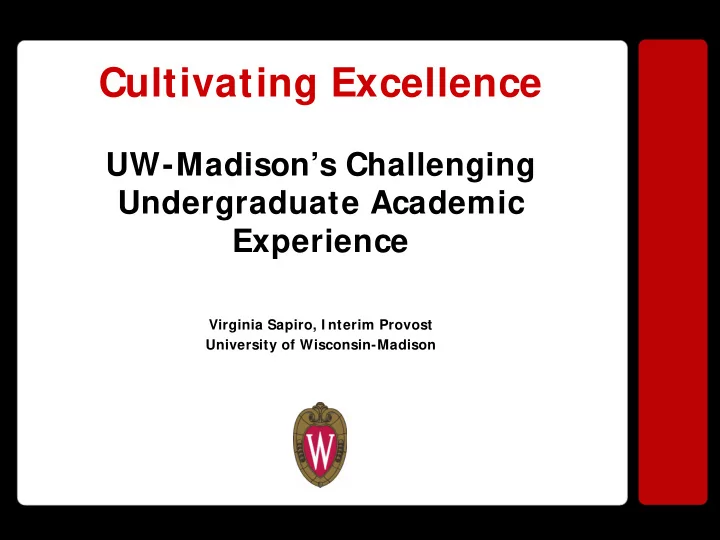

Cultivating Excellence UW-Madison’s Challenging Undergraduate Academic Experience Virginia Sapiro, I nterim Provost University of Wisconsin-Madison
The Boyer Commission on Educating Undergraduates in the Research University REI NVENTI NG UNDERGRADUATE EDUCATI ON: A Blueprint for America's Research Universities 1998
General Education Mission To ensure that every graduate of UW-Madison acquires the essential core of an undergraduate education that establishes the foundations for: � living a productive life, being a citizen of the world, � appreciating aesthetic values, and � engaging in life-long learning in a continually changing world. For this reason, these core requirements provide for breadth across the humanities and arts, social studies, biological sciences and physical sciences; competence in communication, critical thinking and analytical skills appropriate for a university-educated person; and investigation of the issues raised by living in a culturally diverse society.”
Core Academic Enrichment � Living in a residential learning community � Participating in a hands-on research experience � Doing an internship/ fieldwork for academic credit � Taking a service-learning course � Taking an honors course � Taking a seminar � Doing an independent study with a professor � Studying abroad through a UW-Madison program
Strategic Plan Goals Advance Learning: Undergraduate Education � Facilitate students in developing a foundation of knowledge, skills, creativity and love of learning to serve them throughout their lives � Integrate learning throughout the undergraduate experience � Create a learning environment that responds to students’ diverse needs and backgrounds � Assist students in preparing for citizenship in a diverse and global world � Help faculty and professional staff improve their ability to provide first-rate education
Core Academic Enrichment Completed by Graduates Academic Year % of Graduates # of Degrees 2002-03 69% 6,107 2003-04 73% 6,156 2004-05 80% 6,289 Target 100%
Residential learning communities include 1,436 students, 21% of all undergraduates in University Residence Halls. Taken from the Fall 2005 Opening Report for the University Residence Halls, author David Swiderski, Housing Assignment Manager
National Study of Living-Learning Programs (Summary by Professor Aaron Brower) Living-Learning students, as a whole, are more likely to: � Have academic and cultural discussions with peers � Have mentoring relationships with faculty, but not more likely to interact with faculty on course-related matters � Find residence hall climate to be academically and socially positive Plan on the following in the near future: � Practicum or internship - Study Abroad � Research with professor - Senior Capstone or Thesis
National Study of Living-Learning Programs (Summary by Professor Aaron Brower) Living-Learning students, as a whole, are more likely to: � Have a higher cumulative GPA � Plan on returning to same campus next year � Enjoy a smooth transition to college � Use critical thinking skills, apply knowledge across different contexts � Have a stronger sense of civic engagement & empowerment � Drink alcohol to less extremes � Be more satisfied overall and with courses
National Science Foundation Research Experience for Undergraduates Hilldale Undergraduate/Faculty Research Fellowships Wisconsin Idea Undergraduate Fellowships Summer Sophomore Research Apprentices Holstrom Environmental Scholarships
University of Wisconsin-Madison
Recommend
More recommend